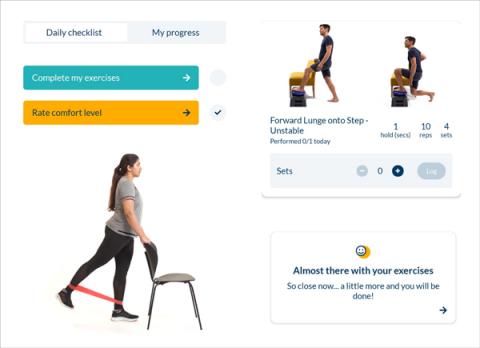Technology is becoming an ever more important tool for medical practitioners across the healthcare sector. In so many ways, the COVID-19 crisis has accelerated that trend, bringing new treatments and new methods of diagnoses and consultation to the fore.
Agile Kinetic, an early-stage business, has developed artificial intelligence (AI) to help healthcare professionals deliver better services to patients. The company has been supported through the Business Wales Accelerated Growth Programme (AGP), which provides targeted support for ambitious growing firms. The programme is part-funded by the European Regional Development Fund through the Welsh Government.
Here, Peter Bishop tells the story of his company’s journey.
Tell us about Agile Kinetic.
The story of the company started with my own experience.
I was always involved in sports coaching and management and I was exploring the idea of creating a platform to support sports coaching. My idea was to use artificial intelligence to remotely identify the proper form and technique of athletes. The platform would map the user’s skeletal positioning and then compare that with proper technique and provide individual feedback and advice.
I’d been developing the idea for a while, but I couldn’t find funding to help turn it into a business. Then I got chatting with someone in the healthcare sector, who explained how the technology could be more useful in an orthopaedic setting. Many conversations and meetings later and after plenty of research, development and investment, we pivoted the business into this new market and we’re getting ready to launch later in 2021.
Now, the platform will receive data from patients through an app on their phone, such as images and pain ratings. In turn, the medical professional will, using the AI technology, monitor their condition and recovery progress remotely. The aim is to cut waiting times, making the process far more efficient, and there’ll be other benefits – like reducing the need to travel to surgeries for routine appointments. And we all know how important that has been throughout the pandemic.
We now have three members of staff – including me – and we’re really excited about the year ahead as we gear up for our launch.
What are your proudest moments in business so far?
Being awarded an Innovate UK Grant as a business offering an innovative response to COVID-19 was a real highlight, as the grants application process was really competitive. So that was a clear sign that we had a great idea which could provide real value to the NHS as it deals with the knock-on impact of the pandemic.
What challenges have you faced in business?
I was already having conversations about the potential for using the technology for medical purposes prior to the COVID-19 pandemic, but the need for such a solution intensified rapidly, so we’ve had to ramp up the pace of development accordingly.
It’s been a huge challenge, but the support of the Business Wales AGP really helped, as well as that of the medical investors who are working with me to bring the product to market.
If you were starting again, what would you do differently?
Although the business is still at an early stage, I’ve learned a lot from small failures along the way. I’d have liked to have been able to learn these lessons faster. In hindsight this could have been possible by reaching out to others who have gone through similar challenges.
I also think that reaching out for support sooner would have helped the business to pivot earlier. And maybe we’d have identified the need for such technology in the medical field faster.
How has support from Business Wales AGP helped your business?
We’ve had a huge amount of support from Business Wales AGP. The AGP helped us to access Welsh Government support, and it led to later successes in Smart Cymru grant applications. The Programme also helped through access to an angel investment network, all of which helped us develop the product to a point where we can conduct final testing.
Business Wales AGP has provided expertise and advice which has helped develop the initial idea into a viable business proposition.
What advice and guidance would you give other businesses starting out?
- Engage with as much literature as you can. Two books that really helped me were The Mom Test and Testing Business Ideas.
- You need to be adaptable. You shouldn’t solely focus on your idea, but instead, uncover a problem, and formulate your idea to solve that problem. That way you will always stay relevant, and your business will always have a deliverable application.
Learn more about Agile Kinetic.
You can find further information on Business Wales Accelerated Growth Programme (AGP)

